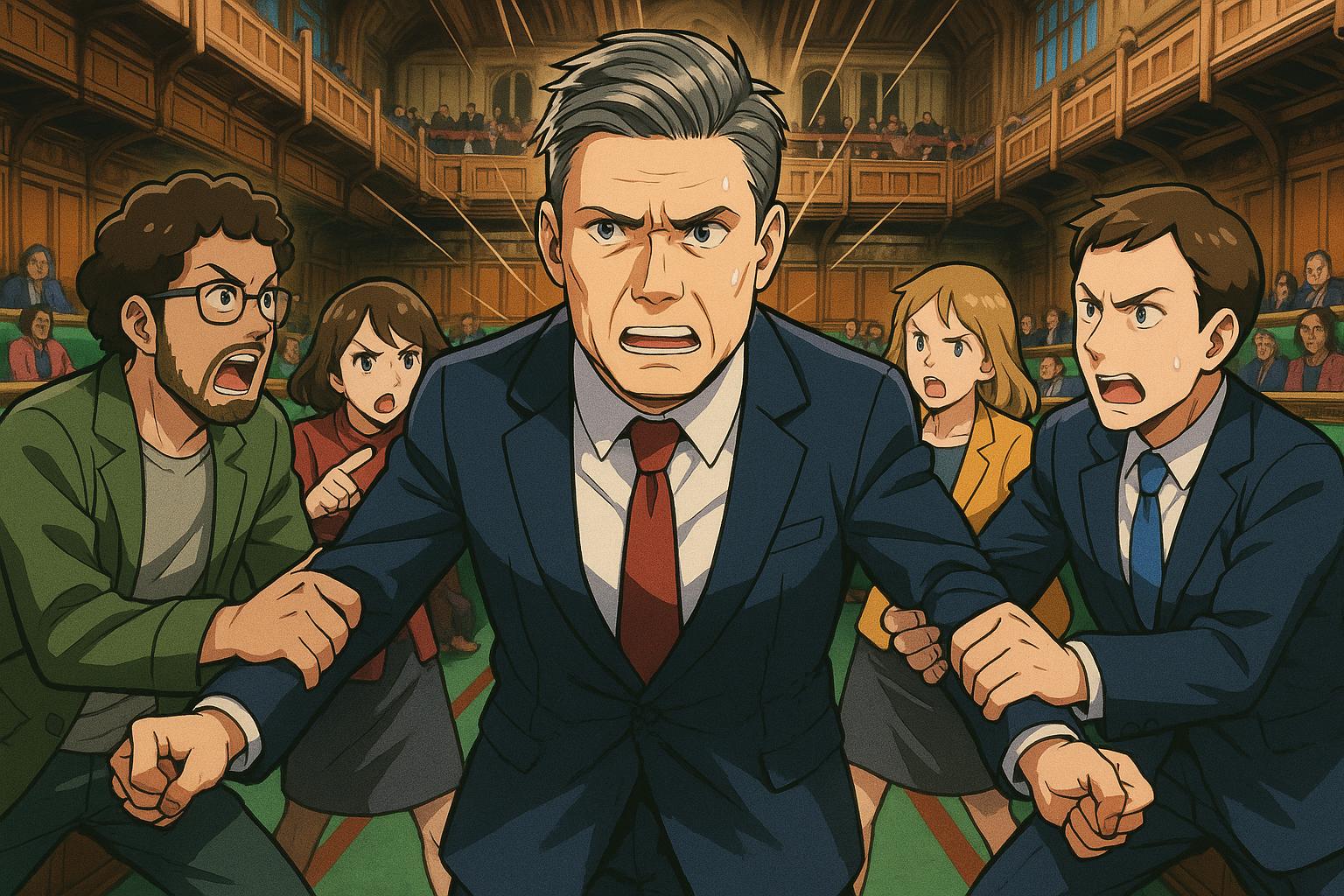Facing pressure from Labour’s left wing and rising opposition, Keir Starmer is abandoning earlier budget discipline, risking internal division and voter alienation at a critical pre-election moment.
Less than a decade ago, Keir Starmer was a staunch ally of Jeremy Corbyn, championing a far-left agenda that many believed would steer the Labour Party into turbulent waters. Now, as Starmer leads a government already facing mounting scrutiny, it’s evident that his attempts to pivot are more about survival than principled leadership. Under pressure from internal factions clamoring for more radical leftist policies, especially on economic issues, Starmer is struggling to reconcile his position with the growing appeal of opposition parties that prioritize common-sense, responsible governance.
Angela Rayner, the Deputy Prime Minister, has recently exacerbated this internal strife by advocating for tax hikes as a replacement for much-needed spending cuts in an upcoming Treasury review. Her leaked memo showcases her alignment with Labour’s more extreme elements, placing Starmer in a precarious position as he tries to maintain control over a party at odds with itself. Many Labour MPs are vocalizing their discontent over proposed welfare cuts, particularly regarding disability payments and the two-child benefit cap—issues that are not just pivotal but also politically perilous for a party attempting to hold on to its traditional base.
Starmer’s retreat from earlier budgetary discipline measures further illustrates his capitulation to the party’s left. Recent indications that his administration may roll back unpopular cuts to winter fuel payments reveal the lengths to which he will go to soothe a restless party. Initially designed to demonstrate fiscal responsibility, this about-face seems less about sound economics and more a desperate ploy to maintain support from discontented party members.
The looming question over the controversial two-child cap on Universal Credit, introduced by the Conservative Party, poses a critical test for Starmer’s leadership. Once committed to upholding this policy, he now finds himself reconsidering in light of growing discontent—not just within his ranks but from external forces as well. Education Minister Bridget Phillipson’s suggestion that abolishing the cap is “on the table” signifies a troubling shift that could undermine Labour’s credibility as a financial steward.
Meanwhile, the emergence of a strong alternative voice in opposition politics adds further complications. The Reform UK party, led by a formidable figure, has successfully articulated a rejection of harmful welfare policies like the two-child cap, appealing to disillusioned former Labour voters who seek real, accountable representation. With the party gaining traction and recent local election victories, the Labour Party’s complacency could be its undoing, compelling Starmer to adjust key policies to salvage support.
This burgeoning crisis extends to Labour’s financial strategy as well, with Starmer caught in a tug of war between imposed fiscal discipline and the left’s expanding appetite for government expenditure. With national spending soaring to unprecedented levels approaching £1.35 trillion—a staggering increase in just five years—the looming specter of tax increases is becoming unavoidable.
In the face of increasing public discontent regarding government inefficiencies, particularly around immigration and housing shortages, Labour’s inability to address these pressing issues could further erode public trust. The risks of alienation in crucial constituencies, especially in historically loyal areas, could easily replicate past political failures that ignited major electoral upheavals.
As Keir Starmer contends with these multifaceted dilemmas, the question looms large: can he effectively reshape his leadership without alienating the very supporters he seeks to retain? With the next general election on the horizon, Labour stands at a crucial juncture. The prospect of a radical leftward shift signifies a dangerous departure from pragmatic governance, leaving many to ponder whether these adjustments will rejuvenate Labour or merely serve as a temporary retreat from accountability and responsibility.
Source: Noah Wire Services
- https://www.dailymail.co.uk/debate/article-14769969/ANDREW-NEIL-Starmer-shifting-Leftwards-tax-rises.html?ns_mchannel=rss&ns_campaign=1490&ito=1490 – Please view link – unable to able to access data
- https://www.reuters.com/world/uk/britain-considers-ditching-two-child-cap-benefit-payments-2025-05-27/ – Britain’s Labour government is considering removing the two-child cap on welfare benefits, a policy introduced by the previous Conservative administration in 2017 that limits financial support to only the first two children in a family. This reconsideration comes in the wake of poor local election results and declining national poll standings, with support shifting toward the right-wing Reform UK party. Education Minister Bridget Phillipson confirmed that scrapping the cap is ‘on the table’ as part of broader efforts to reduce child poverty. Prime Minister Keir Starmer had earlier shown openness to reversing other austerity measures, such as cuts to winter fuel payments for the elderly. Labour had initially chosen to maintain the cap and even suspended seven MPs who voted against it, citing the need to repair the government’s finances. Critics, including veteran lawmaker John McDonnell, argue that removing the cap could significantly reduce child poverty, urging the government to act decisively. A child poverty task force is currently evaluating policy options, acknowledging the challenging economic environment and the impact of past Conservative policies. ([reuters.com](https://www.reuters.com/world/uk/britain-considers-ditching-two-child-cap-benefit-payments-2025-05-27/?utm_source=openai))
- https://www.ft.com/content/1139457f-b53d-44fd-95a5-ceb516329ee6 – UK ministers are considering adjustments to planned welfare reforms to avoid a significant rebellion from Labour MPs. The proposed reforms aim to save £5 billion annually by overhauling disability benefits known as Personal Independence Payments (PIP). One option under consideration would allow individuals who score less than four points in specific assessment categories but achieve a high overall score to retain their benefits, potentially protecting 200,000 recipients. The reform could otherwise affect up to 1.5 million people, with an estimated 800,000 losing benefits outright. More than 160 Labour MPs oppose the plan, raising the likelihood of the largest rebellion of Starmer’s tenure. To maintain party unity, Prime Minister Keir Starmer is also reconsidering other unpopular measures, such as removing winter fuel allowances from 10 million pensioners and maintaining the two-child benefit cap. Any changes would not take effect until November 2026, with a three-year reassessment period for current beneficiaries. The government emphasizes its commitment to supporting those unable to work, stating most current PIP recipients will still qualify under the reformed system. ([ft.com](https://www.ft.com/content/1139457f-b53d-44fd-95a5-ceb516329ee6?utm_source=openai))
- https://www.reuters.com/world/uk/uk-pm-starmer-warns-farages-fantasy-fiscal-plans-would-crash-economy-2025-05-29/ – British Prime Minister Keir Starmer has criticized Reform UK leader Nigel Farage’s economic proposals, warning they could crash the economy if implemented. Starmer described Farage’s tax and spending plans as a ‘fantasy,’ likening them to the failed economic strategy of former Prime Minister Liz Truss in 2022, whose unfunded tax cuts led to market turmoil. As Labour struggles with declining public support due to recent tax hikes and spending cuts, Reform UK has gained traction, leading recent opinion polls. Farage, promoting a blend of right-wing and left-leaning policies, claims Reform represents ‘working people,’ a statement Starmer rebuffed, citing his own working-class roots. The Institute for Fiscal Studies estimated a Reform proposal to raise the income tax personal allowance could cost £50–80 billion. Despite criticism, Starmer retains a large parliamentary majority and is resisting populist pressures, though he is reconsidering some welfare policies. ([reuters.com](https://www.reuters.com/world/uk/uk-pm-starmer-warns-farages-fantasy-fiscal-plans-would-crash-economy-2025-05-29/?utm_source=openai))
- https://www.ft.com/content/34674714-c083-44f9-ad3c-a75c038c911b – Reform UK leader Nigel Farage has vowed to scrap the two-child benefit cap and introduce tax incentives for married couples in a bid to appeal to working-class voters. In a central London speech, Farage criticized the Conservative government for losing touch with common people and highlighted Reform UK’s recent electoral successes, including gaining multiple council seats and a parliamentary seat. Pivoting leftward on economic issues, Farage advocated for policies such as the nationalization of British Steel and key utilities, support for unions, and increased social welfare benefits. He also pledged to reinstate winter fuel payments for all pensioners and argued for a transferable tax allowance of up to £5,000 for married couples. Additionally, Farage proposed raising the income tax-free threshold from £12,500 to £20,000, which could cost £40bn annually. To fund these initiatives, he suggested cutting spending on quangos by 5%, and eliminating £45bn in net zero and £7bn in DEI-related spending, along with shutting down housing for asylum seekers to save £4bn annually. His platform directly challenges Labour and Conservative policies, prompting Labour leader Sir Keir Starmer to reconsider positions on welfare and pension payments. ([ft.com](https://www.ft.com/content/34674714-c083-44f9-ad3c-a75c038c911b?utm_source=openai))
- https://www.ft.com/content/c22cd52a-c930-44c3-9085-6977d4a11f8f – In this episode of the Financial Times’ ‘Political Fix’ podcast, George Parker and team analyze the intensifying political spotlight on Nigel Farage and his Reform UK party. Prime Minister Keir Starmer took aim at Reform’s economic manifesto, comparing Farage’s proposals—such as massive tax cuts and scrapping net zero policies—to the economically disastrous approach of Liz Truss. Despite Reform holding only five seats to Labour’s 403, the government perceives Farage as a substantial political threat. The episode highlights Labour’s own fiscal vulnerabilities. Starmer’s recent U-turns on winter fuel payments and potentially the two-child benefit cap may add billions to government spending, straining Chancellor Rachel Reeves’ attempts to maintain fiscal discipline. With rising pressure from market jitters, possible tax hikes are on the horizon—especially if projected growth rates are downgraded by the OBR. Additionally, the team dissects Farage’s populist economic agenda, which mixes large tax breaks and costly state interventions without clear funding plans. They debate whether Labour’s strategy to counter Farage early is wise, considering the election is still years away. Overall, the episode explores the challenging terrain of UK economic credibility, political strategy, and looming fiscal decisions. ([ft.com](https://www.ft.com/content/c22cd52a-c930-44c3-9085-6977d4a11f8f?utm_source=openai))













